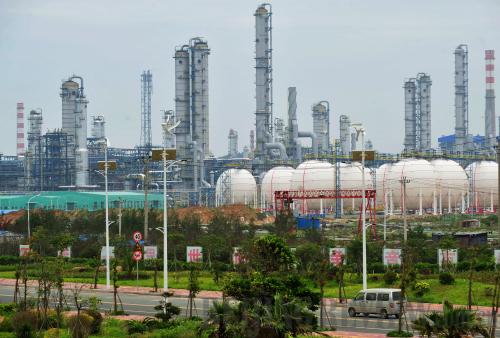|
 |
|
PRODUCTION RELOCATED: A paraxylene project in Zhangzhou, Fujian Province, prepares for trial production on April 26. The plant, originally built in neighboring Xiamen, was moved to a peninsula in Zhangzhou after it raised a storm of protests from Xiamen residents in 2007 (WEI PEIQUAN) |
Updated response needed
Projects opposed by residents are not limited to industrial projects. The Beijing Municipal Government's plan to build a waste incineration power plant in the outlying Liulitun area was dropped in 2011 after residents stepped up a four-year campaign against it over pollution concerns. The plant was moved to a more remote and less populated location.
Many people in China as well as other countries are disinclined to accept the construction of such facilities as power plants, oil refineries, disposal sites, crematoriums and mental hospitals, near their homes, hence the slogan "not in my backyard" (NIMBY).
Environmental experts generally blame the rise of NIMBY movements on environmental degradation in China, where sound ecosystems are becoming scarce. Recent years have witnessed more of the side effects of China's rapid economic growth: pollution and ecological deterioration. Residents suffering from the effects of the deterioration demand the relocation of high-pollution companies and improved local environmental governance.
Frequent NIMBY incidents may also be blamed on a lack of sound environmental information.
Wang Xixin, a law professor at Peking University, said that while many PX projects have been discarded due to public complaints, local governments failed to spread true information on the projects' potential effects on health.
According to Wang, Osaka is home to Asia's largest PX plant, which is only 1 km away from residential communities while a PX plant in Singapore is only 0.8 km from residential areas. He said that some environmental experts in China made unsubstantiated claims that international norms require PX plants to be 100 km from residential areas.
As a result, people are unnecessarily terrified by the possibility of living close to a PX plant, Wang said, adding that the government should adopt a tolerant attitude toward residents' self-governance.
Professor He said that in order to enhance government credibility, the priority is to establish a decision-making process that involves those who would be adversely affected by the environmental impacts of the projects and make this process totally transparent.
"If the projects or facilities could benefit the majority of people while harming the interests of a small group, the government should sit with them for negotiations," said He.
Tighter rules
Over the years, China has worked hard to establish the environmental rights of citizens. The Environmental Impact Assessment Law, which became effective on September 1, 2003, requires operators to survey public opinion before submitting environmental impact assessment reports for government approval if their projects may have adverse environmental impacts or may affect public environmental interests.
The Measures for Environmental Petitions, promulgated by the State Environmental Protection Administration, now the Ministry of Environmental Protection, went force on July 1, 2006. It went further by stating that the complaint system must protect the lawful environmental rights and interests of claimants.
According to the administration's Measures for the Disclosure of Environmental Information, which was put into trial implementation on May 1, 2008, the public release of environmental information is a compulsory responsibility of local environmental protection departments. Despite progress of laws and regulations, the public has expressed dissatisfaction with their enforcement. In reality, local officials besieged by environmental protests simply insist that the controversial projects at stake have passed their environmental impact assessments.
Xiong Mengqing from Guangzhou Urban Waste Management Center in Guizhou Province, who has participated in several environmental impact assessments, said that it is key to avoid forgery and a perfunctory attitude toward the procedure of public participation during such assessments. "To reduce NIMBY safety fears, the government should invite public participation on a larger scale to collect all kinds of suggestions," he said.
Email us at: lili@bjreview.com | 